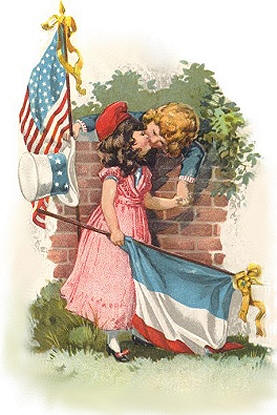The Signers Of The Declaration Of Independence
Have you ever wondered what happened to the 56 men who signed the Declaration of Independence?
Five signers were captured by the British as traitors, and tortured before they died.
Twelve had their homes ransacked and burned.
Two lost their sons serving in the Revolutionary Army, another had two sons captured.
Nine of the 56 fought and died from wounds or hardships of the Revolutionary War. They signed and they pledged their lives, their fortunes, and their sacred honor. What kind of men were they?
Twenty-four were lawyers and jurists.
Eleven were merchants, nine were farmers and large plantation owners; men of means, well educated.
But they signed the Declaration of Independence knowing full well that the penalty would be death if they were captured.
Carter Braxton of Virginia, a wealthy planter and trader, saw his ships swept from the seas by the British Navy. He sold his home and properties to pay his debts, and died in rags.
Thomas McKeam was so hounded by the British that he was forced to move his family almost constantly. He served in the Congress without pay, and his family was kept in hiding. His possessions were taken from him, and poverty was his reward.
Vandals or soldiers looted the properties of Dillery, Hall, Clymer, Walton, Gwinnett, Heyward, Ruttledge, and Middleton.
At the battle of Yorktown, Thomas Nelson, Jr., noted that the British General Cornwallis had taken over the Nelson home for his headquarters. He quietly urged General George Washington to open fire. The home was destroyed, and Nelson died bankrupt.
Francis Lewis had his home and properties destroyed. The enemy jailed his wife, and she died within a few months.
John Hart was driven from his wife's bedside as she was dying. Their 13 children fled for their lives. His fields and his gristmill were laid to waste. For more than a year he lived in forests and caves, returning home to find his wife dead and his children vanished. A few weeks later he died from exhaustion and a broken heart.
Norris and Livingston suffered similar fates.
Such were the stories and sacrifices of the American Revolution. These were not wild eyed, rabble-rousing ruffians. They were soft-spoken men of means and education. They had security, but they valued liberty more. Standing tall, straight, and unwavering, they pledged:
"For the support of this declaration, with firm reliance on the protection of the divine providence, we mutually pledge to each other, our lives, our fortunes, and our sacred honor."
They gave you and me a free and independent America.
The following document was sweeping through our email systems. The author is unknown!
**Note: On July 4, 2001, in Ann Landers column, a history buff from Dallas shared further information. He stated that most of the above was true, but unfortunately, a lot of the information was incorrect or misleading. He shared the following:
No signer was killed outright by the British, and only one, Richard Stockton, is said to have been imprisoned solely for having signed the Declaration of Independence. The others were captured while fighting in the army and were treated just like any other prisoner of war (which was fairly harshly), but they were not tortured. Of the 56 signers, 17 (not nine) held commissions in the army or did medical duty during the war. Many of those whose property was looted or destroyed managed to re-establish themselves financially after the war.
Carter Braxton did suffer financial hardship because of the British, but he retained other holdings. What ruined him were commercial setbacks after the war. Thomas McKean did not die in poverty. In fact, he was quite wealthy when he died at the age of 83 in 1817. No one knows for sure if Thomas Nelson's home was fired upon (the source of this story is family legend), but he heard the home was turned into a tourist attraction after the war, and additional cannonball holes were added for "authenticity."
The other facts are essentially corect, but they give the impression that these men died as a result of wounds suffered in the war, or they died in poverty. In reality, the majority survived the war and rebuilt their fortunes.
The signers of the Declaration of Independence knew they could have been targeted by the British as traitors. They showed tremendous courage and bravery by willingly putting their names on a document that could bring about their deaths. They were remarkable men. We do not need to embellish the truth.
**Additional Note: It seems there has been some controversy about the author of the above. Some insisted the original piece was written by the father of Rush Limbaugh, Jr. (Rush, Sr.) Another said the author was peter McWilliams, a libertarian writer. Others say the true author is Gary Hildreth of Erie, PA.
